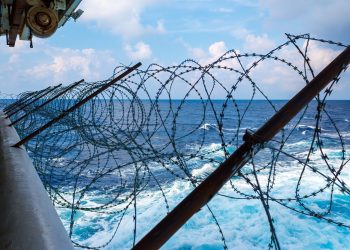Oil shipping companies have tightened operational guidelines and use technology to prevent accidental breaches of sanctions.
This comes as the countries hit by ever tougher restrictions fight back with elaborate strategies to dodge them.
According to Reuters, the US have increased shipping-related sanctions over the last two years to make it harder for countries, such as Iran and Venezuela, to export the oil that provides their main source of revenue.
In response, Iran and Venezuela have developed methods to bypass sanctions, which are also imposed to a lesser extent by the European Union.
As a result, shipping firms find it difficult to avoid facilitating blacklisted exports unwittingly, potentially laying them open to being cut off from the U.S. financial system or even having assets seized.
One way to evade sanctions is to hide behind the practice of transferring oil from one ship to another at sea, known as a ship-to-ship (STS) transfer.
Sanctions dodgers can use STS to falsely document the origin of the oil as a country near to where the transfer takes place rather than its true origin.
In fact, Maersk Tankers, said that it was contending with the falsification of cargo documentation, making legitimate use of STS transfers harder.
The company has also deployed new technology to screen vessel movements and ownership structures to detect any suspicious activity that it can investigate further.
However, in December and January, two vessels managed by Maersk Tankers almost took on cargoes of Iranian oil whose origin was concealed. The STS operations were stopped before the cargoes were transferred after Maersk Tankers was alerted by U.S. pressure group United Against Nuclear Iran (UANI).
Other major companies are also separately trying to unmask the illicit activity. Namely, Cargill has increased scrutiny of every party it trades with, including ownership structures.
Moreover, Shell has raised the issue of risks with cargo documentation, which is not standardised across the industry with different regulations in different jurisdictions adding to the complexity.
According to the MARPOL international maritime convention, ships planning STS in territorial waters must give notice to the coastal authority 48 hours in advance, while companies conducting STS in open sea lanes are meant to notify the flag registry.
Furthermore, all commercial ships have to be registered, or flagged, with a particular country, to comply with safety and environmental regulations. Smaller flag registry countries usually lack the resources to monitor the volume of STS that takes place in open seas.




























































